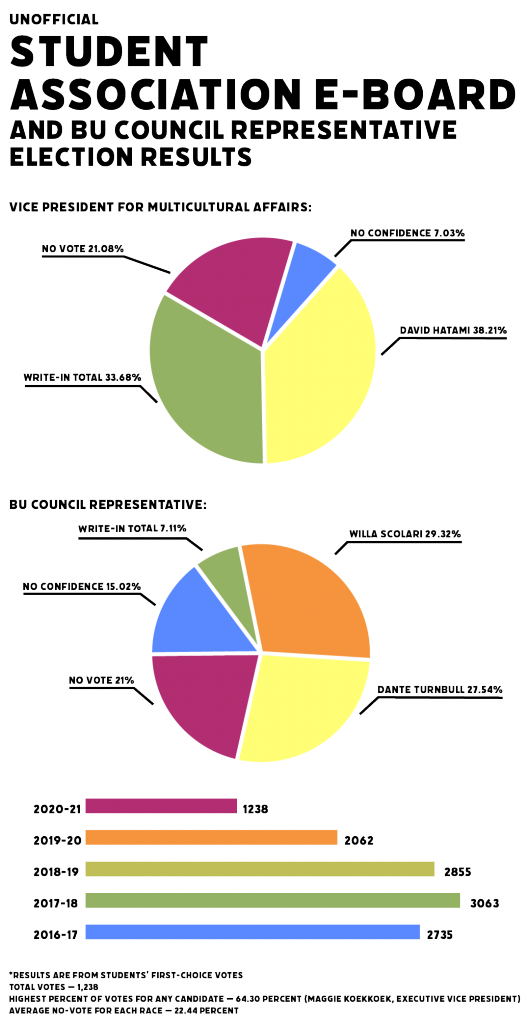Unofficial election results are in after a total of 1,238 undergraduate students voted in Student Association (SA) E-Board and Binghamton University Council representative elections on Tuesday, and now, new student leaders are preparing for their future roles.
The results of the races saw Khaleel James, a junior double-majoring in economics and human development, win president; Maggie Koekkoek, a junior majoring in biomedical engineering, win executive vice president (EVP); Jacob Eckhaus, a junior double-majoring in economics and business administration, win vice president for finance (VPF); Joshua Dorfman, a sophomore majoring in integrative neuroscience, win vice president for academic affairs (VPAA), David Hatami, a sophomore majoring in political science, win vice president for multicultural affairs (VPMA) and Sophia Cavalluzzi, a junior majoring in English, win vice president for programming (VPP). Additionally, Willa Scolari, a sophomore majoring in biology, took the BU Council representative position.
The online election marked one of the lowest SA election turnouts in the University’s history and is the only time in the past four years that less than 2,000 students voted. Ross Mesnick, chair of the SA Elections and Judiciary Committee and a sophomore majoring in business administration, said the lack of participation came amid class cancellations related to the COVID-19 outbreak.
“I think the low turnout can be attributed to the fact that since a lot of people moved out on Tuesday, the response might have been lower than if people moved out later or if the University hadn’t canceled classes on Tuesday,” Mesnick said. “If we weren’t dealing with the coronavirus epidemic, I believe turnout would have been higher.”
Another reason for the low turnout might have been the lack of opposition for most of the candidates. Only the BU Council representative position was officially contested. The vice president for multicultural affairs (VPMA) race saw a write-in candidate, but all other SA E-Board positions were uncontested.
Despite the lack of competition, a large number of students opted to not vote in individual races, and across the board, the average no-vote for each election was 22.44 percent — almost a quarter of student voters. Koekkoek had the most votes of any candidate in the race, receiving 64.3 percent of ballots. Still, her lead was notably lower than that of uncontested candidates in last year’s elections, where most candidates received more than 90 percent of their respective vote.
The no confidence vote total was especially high in the BU Council representative race, which was between Scolari and Dante Turnbull, a junior double-majoring in history and philosophy. Scolari narrowly won, receiving 29.32 percent of the undergraduate vote, while Turnbull received 27.54 percent, and 15.02 percent of voters indicated they had no confidence in either candidate or a write-in.
The BU Council representative is elected by both undergraduate and graduate students at the University. Mesnick said these totals only included undergraduate votes, and when the Graduate Student Organization (GSO) votes were included, Scolari’s lead increased. The GSO only takes part in the BU Council representative election, and not the SA E-Board elections.
The only race to see close results was the election for the VPMA position. The ballot had only one official candidate, Hatami, who won with 38.21 percent of the vote; however, Michael Messina, a junior double-majoring in physics and political science, ran as a write-in candidate. While it is unclear how much of the write-in vote was directed toward Messina, the write-in total made up 33.68 percent of the election.
On election day, students also voted continue the student activity fee. About 74 percent of students voted to keep the $99 fee, which provides funding for SA-chartered groups, on-campus performances, Off Campus College Transport and Harpur’s Ferry. The SA is required to hold a referendum on the fee every two years.
Roughly 92 percent of voters also approved changes to the SA constitution, which set a timeline for community governments to fill vacancies, revamped the way SA E-Board vacancies are filled and made several wording and grammatical changes.



